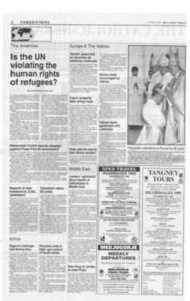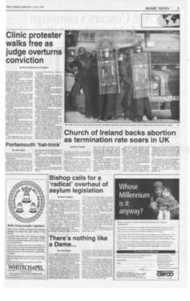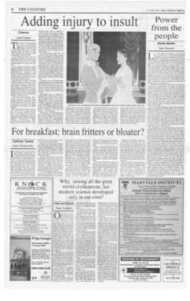Page 8, 4th June 1999
Page 8

Report an error
Noticed an error on this page?If you've noticed an error in this article please click here to report it.
Tags
Share
Related articles
Who Exactly Is Running The Country?
Trust Me, I’m A Journalist
Nothing To Fear From The Power Of The Press
Blair Rejects Scots Bid To Reform Act Of Settlement
Helping Blair Win The Media War
Power from the people
Media Matter Nick Thomas
LAST WEEK there was a debate at the Oxford Union on the motion "This House believes that the Media are more powerful than the Government", a proposition supported by Simon Kelner, editor of The Independent and disputed by the veteran all-rounder Libby Purves. I turned up to hear the opposition case rounded off by my old chum Boris Johnson, waspishly lugubrious deputy editor of the Telegraph; instead I found myself singing for my supper as his last minute replacement (thanks, Boris). This was daunting enough, but my heart sank steadily during the debate as all the random ideas I had scrabbled together over dinner were ticked off one by one by the speakers preceding me. Then the Indie supremo came to my rescue by asserting that the emphasis placed by this Government on the concerns and opinion of the public afforded the media a uniquely pivotal role in the operation of our democracy.
I found this disingenuous, and said so. Our current masters have a certain genius for doing one thing and calling it something else, but it is knowing just what to call it that makes the listening exercise so vital to their strategy. We tell them what we want, and then they tell us they've done it, like the salesman who convinces you that the horrible suit he's been trying to shift for a month was exactly what you were looking for when you walked in. To use while appealing to be used is an age-old political technique, but it has never before been employed in this country on such a grand scale. If even our broadsheet editors are falling for the con then we really are in trouble.
It was not without significance, either, that all the guest speakers contributing to this discussion were journalists. The president had, of course, done her best to secure the attendance of Government representatives, but without success, and this has mostly been the experience not only of her predecessors at Oxford, but of every student forum in the land, ever since the last election. That's how much these people really care about public debate, or the views of the young electorate they worked so hard to seduce while in opposition. Surely this cavalier complacency must rebound on them in the end? Hell hath no fury like a voter scorned.
As it happens my very first experience of the Oxford chamber involved the motion "That the British Press is irresponsible and abuses its freedom". Spot the difference? Some time in the last 22 years we have stopped worrying about freedom and become obsessed with power instead. It makes the 1970s seem like a more innocent, more idealistic age, in contrast to the usual rremory of a period of post-hippie cynicism. Back then we concerned ourselves with the disenfranchised peoples of Black South Africa and the Soviet Bloc, aware that democracy implies the freedom to cede power to government and, more importantly to reclaim it at will. (The same principle applies to the press, though it is easier and quicker to stop buying a newspaper than to sack a political party.) But we seem to have become less secure in the assumption that that power naturally resides vith the people, possibly because of the rise of the referendum and the focus group... it looks too open and liberal; there must be something wrong. For as Ken Livingstone memorably observed, if voting changed anythingthey'd abolish it, and the cacophony of a million soapboxes merely atomises the authoritative voice of the nation.
So where does this leave the media? Tragically, unwittingly complicit in the new democratic illusion, they daily distract their audience from the creeping los of its ancient liberties, even as they try to draw attention to it. It seems we all need a refresher course in tle link between power and freedom, and in how to safeguard our natural right to both.
blog comments powered by Disqus













